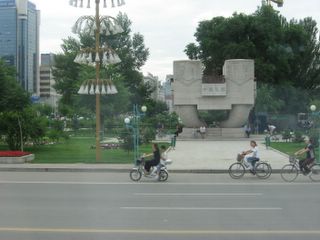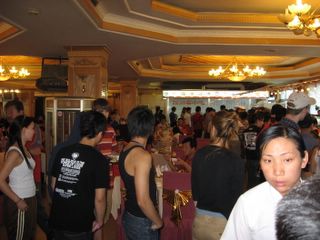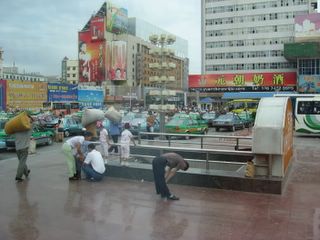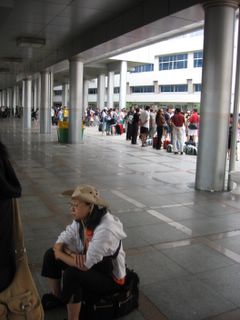Friday, September 15, 2006
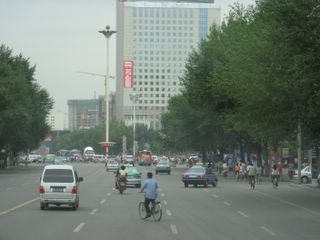
Huhhot is not Mongolia's biggest city, but is certainly its most developed and rather pleasant (though the streets are all abnormally wide). What is Mongolia's biggest city, you might be wondering? That honor goes to the coal mining slumopolis of Baotou, served directly from Beijing and Shanghai with many trains a day...the line by JinWuXing under the Chengtie (overhead subway) is actually the Beijing-Baotou mainline going to Beijing North Station. Most trains now skip the last part and head to the huge Beijing West Station, instead.
EAP China! Robert Klein.
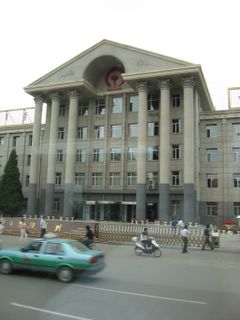
The symbol at the top of this building is for the Chinese railway network. Huhhot is a major rail hub, with many trains going to Beijing, Baotao, the south, and even Mongolia proper. The "khanate local" (my term, not theirs) leaves from Huhhot, goes northeast to same the Mongolian border crossing as the Trans-Mongolian to Moscow, and cuts northeast to Ulan Bator, which means "Red Hero," in the Mongolian language, a legacy of Mongolia's communist revolution (though the Chinese like to think of it as the time Russia took Mongolia away) that remains to this day.
EAP China! Robert Klein.
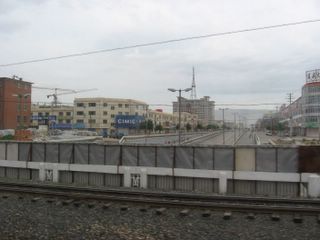
Welcome to Hohhot, capital of NeiMengGu, ancient center of Tibetan Buddhism, introduced to the masses by mongol rulers who constructed many of Hohhot's temples. The idea was to take buddhism beyond the mongol elite who had adopted it (ironically enough) as a way of cementing power by providing a religious justification to their rule to counter the traditional Chinese religious practices which supported the legitimacy of the previous imperial dynasty.
EAP China! Robert Klein.

The train line through here is quite built-up, with multiple tracks, roadcuts and tunnels for when the distant mountains became imminent ones. I saw a few other passenger trains (far more than you usually see on an American train ride, since Hohhot is a major railway hub). But these seem secondary to the many coal trains that are feeding power plants throughout China.
EAP China! Robert Klein.
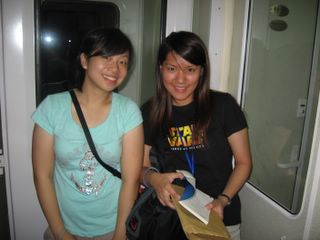
I ended up back at the bunks of my east coast friends and got to talking with the Taiwanese across the way. They were part of a giant group of Taiwanese students travelling around China and I ended up meeting two of their anglophone friends as they walked by. I learned a great deal about Taiwanese politics from these two. If you already are familiar with Taiwanese politics, stop reading because the information is quite basic, but it was largely new to me. While I knew that the GuoMinDang decamped to the island with the Chinese national treasury and a huge number of supporters in tow, I was under the impression they outnumbered the orginal inhabitants of Taiwan, which they didn't. In fact, since Taiwan has become democratic the ethic taiwanese (as opposed to those recently from the mainland) have sought to reestablish power, and largely support the fairly pro-independence party of current president Chen Shui Bian. The decendents of the GuoMinDang's followers are largely in support of the status quo and the idea of eventual reunification, though the new generation is less rigidly split along the same lines as their parents. Lucky for pro-reunification voices on both sides of the strait, though, Chen Shui Bian is corrupt as all get out, has funneled significant cash to family members, and has probably set his party back significantly. Most of the Taiwanese who left Taiwan, however, are those originally from the island who felt pushed out by the newcomers, thus emigrating to places like America. As a result, we have the relatively pro-independence stance of much of the overseas Taiwanese community. Man, I love politics!
EAP China! Robert Klein.
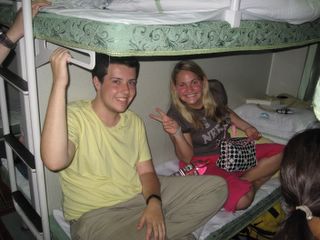
Fun as the EAPers were, I decided to take a walk on the train, which is an entirely, or almost entirely sleeper express with no stops between Beijing and Hohhot. Looking for some friendly faces, I ran into four Americans from the east coast. Though they're all from different schools they're all at the same Beijing university for Chinese courses, where they're not allowed to speak any english without danger of dismissal from the program. That's vaguely interesting to those who can already speak, but unfortunately, the fine fellow in yellow can barely speak a word.
EAP China! Robert Klein.
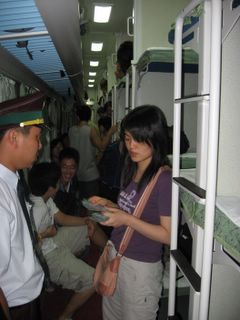
Of course, one of the great perks of being on EAP (especially during the summer) is that despite enjoying the benefits of college, we get field trips with our Beijing EAP staff like Bonnie, who is holding over 100 of our tickets. For the record, she's a recent Peking University graduate (originally from Chengdu, I believe) who majored in international relations. She's continuing on in grad school after the summer.
EAP China! Robert Klein.
Monday, September 11, 2006
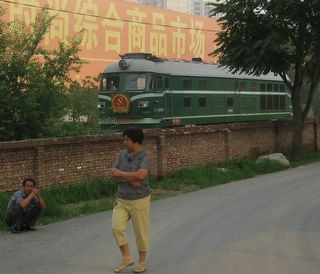
I had more pictures of the area south of the mud, which features a nice park full of old people fishing despite admonisions to the contrary (any fishing in China requires a permit). They also suggested I wash off in the creek below, as many people were swimming there to escape from the summer heat, but I decided against it. Unfortunately, these pictures were deleted along with over a hundred I took of us leaving Beijing West Station and first getting onto our express sleeper train to Hohhot, the capital of Inner Mongolia when, in an attempt to see how much memory remained on my camera, I accidentally reformatted my memory card. Sorry about that. On the bright side, this AWESOME train was on a different card I had already downloaded. I think it's an official train, since it's A. spotless, unlike the rather scuzzy looking stuff that usually uses this line, B. only this car, and C. doesn't sport a Chinese Railway logo but a shiny hammer and sickle.
EAP China! Robert Klein.

I continued to bike further down this way, toward the oncoming buldozer because I believed this path would be a car-free way to get to a Japanese supermarket owned by the (Japanese) parent company of 7-11. The goal was to pick up some Japanese snacks, specifically rice wrapped in seaweed, for the EAP trip to Inner Mongolia leaving in a couple hours. This was a good idea. Walking my bike right through that several feet-deep mud ahead despite suggestions that I use the dirt path on the right side of the tracks, on the other hand, was not.
EAP China! Robert Klein.

